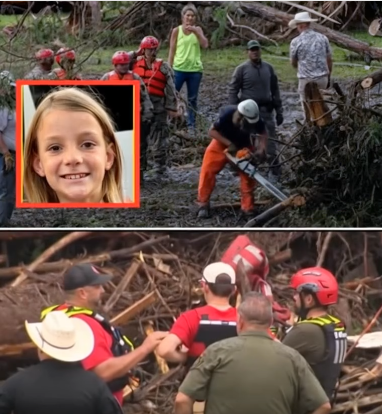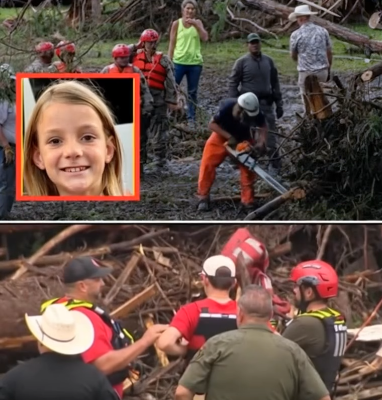Emotional Silence: Rescue Worker Locates Final Flood Victim, Hiding the Toll of Tragedy
TEXAS—After a grueling, multi-week search operation following the catastrophic flash floods that devastated parts of Central Texas, authorities have officially confirmed the recovery of the final missing person. The discovery brings a grim closure to the exhaustive and emotionally draining efforts, but the silence of the veteran rescue worker who made the recovery speaks volumes about the enduring sorrow left in the tragedy’s wake.
The victim, a young girl who was the last of 27 campers swept away from the popular Camp Mystic site, was located by a veteran emergency responder miles downstream from the camp’s original location. Her recovery marks the end of a desperate and determined operation that involved hundreds of personnel, search dogs, and advanced sonar equipment, spanning the entire length of the river system affected by the unprecedented flooding.
The Uncharacteristic Quiet of a Veteran Responder
The rescuer who made the discovery is an unnamed veteran known for his decades of service in some of the most challenging natural disaster zones, both domestically and internationally. Colleagues describe him as a professional who, despite the horrific scenes he has witnessed, always maintains composure and communicates clearly with officials and families.
However, the moment of this final recovery was different. According to several witnesses from the search team, the veteran responder, after confirming the identity of the young girl, did not engage in the usual procedural discussions or debriefing. Instead, he reportedly quietly stepped back from the recovery site.
“He just stood there for a minute, looking at the scene, and then turned away,” one official who was present reported. “He wouldn’t say a word. When we tried to thank him or ask for details, he just shook his head and walked off toward the command center.”
His reaction—an uncharacteristic refusal to speak after such a significant, albeit tragic, success—has been widely interpreted as a visible sign of the heavy psychological toll this particular disaster has taken on the entire response community. It is a moment of profound, wordless grief that seems to encapsulate the sheer scale of loss experienced by the region.
Closure Mixed with Community Grief
While the discovery ends the ambiguity for the family of the young victim, allowing them to begin the painful process of mourning, it does not alleviate the deeper suffering within the wider community.
Camp Mystic, a staple in the region for generations, will forever be linked to this devastating event. The 27 lives lost—a mix of young campers, counselors, and staff—have cast a long shadow over the tight-knit Texan community. Local leaders have emphasized that while the search phase is over, the recovery process for the community has only just begun.
A statement released by the affected families expressed profound gratitude for the exhaustive efforts of the emergency teams, noting that the closure achieved through this final recovery, while heartbreaking, is an essential first step.
The quiet, solitary response of the veteran rescue worker serves as a stark reminder that even those trained to handle the worst crises are not immune to the deep, cumulative human cost of tragedy. His silence speaks louder than any official report, signaling that some burdens of sorrow are simply too heavy for words.
The community now faces the task of healing. What kind of long-term support do you think is most crucial for the families and the first responders after a tragedy of this magnitude?




